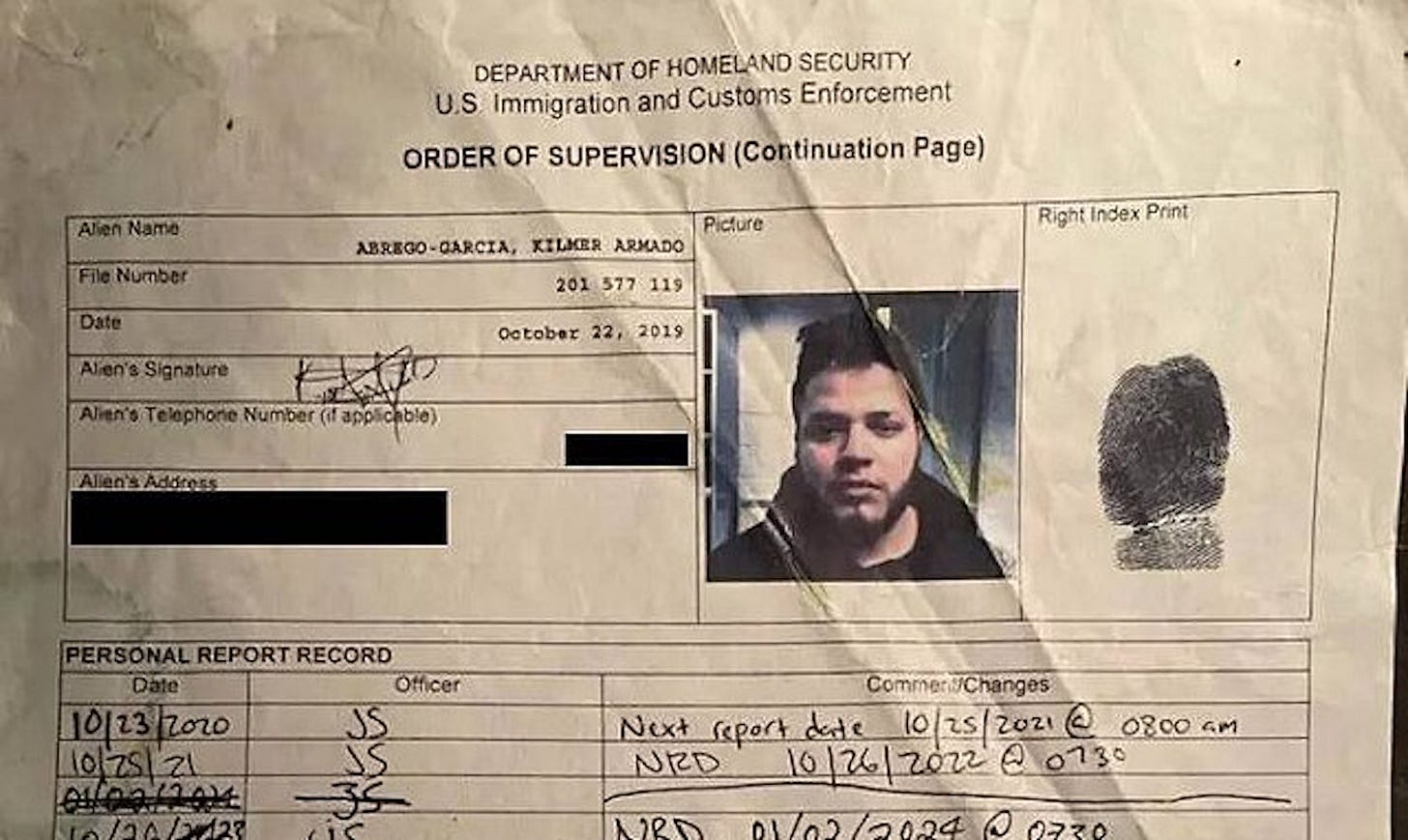Kilmar Abrego Garcia's continued detention is "unauthorized," his lawyers say
Abrego’s attorneys argue that Trump’s zeal to make an example of him backfired
Kilmar Abrego Garcia’s habeas corpus lawsuit heads to a hearing on Monday.
All Rise News will continue to cover his cases in depth and detail.
The Trump administration botched its chance to deport Kilmar Abrego Garcia “immediately” by insisting on sending him to countries where they could not guarantee his safety, the Maryland man’s attorneys wrote in a new filing.
“The Government’s attempts to shield its actions from judicial review reveal a troubling pattern that permeates the litigation surrounding petitioner Kilmar Armando Abrego Garcia: the Government tries to deploy procedural hurdles to evade accountability for substantive violations of law,” Abrego’s attorney Jonathan Cooper wrote in a legal brief on Monday. “It is clear that the Government has violated statutory requirements governing removal, ignored [Abrego]’s designation of Costa Rica as his removal destination, and transformed both third-country removal and civil immigration detention into a punitive mechanism, all while engaging in gamesmanship to delay resolution of [Abrego]’s claims.”
The latest filing previews the arguments Abrego’s legal team might make in their habeas corpus before U.S. District Judge Paula Xinis during a scheduled hearing on Monday.
“The Temerity to Seek to Vindicate His Rights”
After two judges ordered his release from pre-trial detention, Abrego faced an ultimatum from prosecutors: He could plead guilty to charges of smuggling immigrants and face deportation after serving his sentence to Costa Rica, a country that promised not to deport him back to El Salvador.
If Abrego did not plead guilty before his release on bail, prosecutors threatened to send him to human rights abusing countries in Africa — first Uganda, and then Eswatini, the last absolute monarchy on the continent.
“The Government explicitly linked Petitioner’s continued detention to his ongoing criminal proceedings, transforming civil immigration detention into a mechanism for criminal leverage,” the legal brief notes. “The Government refused to remove Petitioner to Costa Rica unless he accepted a plea deal in the criminal case. … The District of Maryland has been flooded with cases of Central Americans seeking to prevent third-country removal to Mexico; in not one other case has the government threatened to send a Central American across the Atlantic Ocean.”
Abrego’s lawyers noted that prosecutors could have “immediately” deported their client to Costa Rica, which their client lawfully designated as his preferred country of deportation.
“Instead, the Government says that it seeks to remove [Abrego] to other countries (first Uganda, now Eswatini) that have publicly indicated they would not accept [Abrego] and that otherwise flunk the legal test to serve as viable removal destinations for Petitioner,” the filing states.
Since his release from pre-trial criminal custody in August, Abrego has spent most of his time in immigration detention, first in a Virginia facility and then in Phillipsburg, Penn. Abrego’s lawyers say that the government is “content to let [him] languish in civil detention indefinitely, both as a punishment to [him], and as a warning to others, for having the temerity to seek to vindicate his rights in court.”
“A pattern of misconduct”
Abrego’s lawyers argue that this choice has backfired for the Trump administration because of public statements by Eswatini’s government.
Earlier this month, the Eswatini government also told Reuters that the U.S. government never notified them of Abrego’s removal to that country. The African nation also publicly announced that anyone deported there would be “repatriated to their respective countries.”
A U.S. court order blocks Abrego’s deportation to El Salvador, where he faces persecution.
The Supreme Court precedent of Zadvydas v. Davis limits the length of time the government can detain someone when there is no significant likelihood of removal.
“That is the exact situation here,” Abrego’s lawyers write, referring to the Zadvydas precedent.
Abrego’s attorneys write that the Trump administration’s zeal to make an example of their client makes his continued detention “unreasonable and unauthorized.”
“The Government’s pattern of misconduct toward [Abrego] reveals detention maintained for purposes wholly divorced from legitimate administrative function,” the filing states. “As the Court previously observed, the Government ‘ha[s] taken the presumption of regularity and [they’ve] destroyed [it] . . . because [the Court] can’t presume anything to be regular in this highly irregular case.’”
Judge Xinis presided over two of Abrego’s lawsuits. The first challenged his expulsion to El Salvador, where her order for his release from CECOT prison was affirmed by the Supreme Court. She is now presiding over a separate habeas corpus lawsuit to protect Abrego’s rights as the government attempts to deport him.
Separately, Abrego faces criminal prosecution in Nashville, Tenn., if the government does not deport him before a trial currently scheduled for January.
Read the full filing here.





behind-the-gold-throne dictator Miller is actually an alien...from another planet. Just look at the photos. He should be exported to a suitable asteroid.
❣️Thanks -Adam Klasfeld
https://bsky.app/profile/kenaiseasky.bsky.social/post/3m232xcwus226